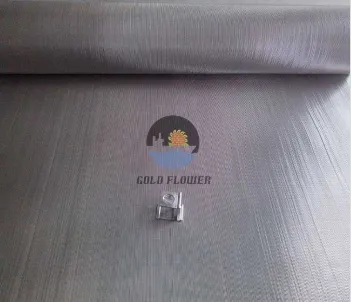Jan. . 02, 2025 09:49 Zurück zur Liste
The Role of Stainless Steel Woven Cloth in Industrial Filtration Systems
Industrial filtration is a critical process across various industries, including chemicals, food and beverage, pharmaceuticals, water treatment, and oil and gas. Efficient filtration ensures product purity, operational safety, and compliance with environmental regulations. Stainless steel woven cloth plays a significant role in enhancing filtration performance, offering durability, reliability, and precision that other materials may lack.

Stainless woven wire mesh is known for its unique combination of mechanical strength, temperature resistance, and chemical inertness. These properties make it ideal for industrial filtration systems where traditional materials may falter. From solid-liquid separation to gas filtration, stainless steel mesh is used in a wide array of applications, each requiring specific properties that the material can deliver effectively.
Advantages of Stainless Steel Woven Cloth in Filtration Systems
One of the primary advantages of stainless steel wire cloth in industrial filtration systems is its exceptional strength. Unlike other materials, stainless steel mesh can withstand high pressures, extreme temperatures, and harsh chemicals, which are common in industrial environments. This makes it highly effective for separating fine particles from liquids or gases, especially in high-performance settings such as petrochemical refineries or power plants.
Additionally, corrosion resistance is another key benefit of stainless steel woven cloth. In industries where chemicals and corrosive substances are processed, such as in the food and beverage or pharmaceutical sectors, the durability of stainless steel ensures long-lasting performance without compromising the quality of the filtration process. This corrosion resistance also extends the lifespan of the filters, reducing maintenance costs and downtime.
The precise and consistent pore size of stainless steel woven mesh allows for fine filtration. Different weaving patterns, such as plain weave, twill weave, or satin weave, can be tailored to specific filtration requirements, ensuring that only the desired particles are captured while maintaining the flow rate of the system. This high level of customization is invaluable in industries like water treatment, where fine filtration is crucial for removing bacteria or other contaminants.
Applications of Stainless Steel Woven Cloth in Various Industries
Stainless steel woven cloth is indispensable in a wide range of industrial filtration applications. In the chemical processing industry, it is often used for filtering solvents, acids, and other aggressive chemicals. The material's resistance to corrosion ensures that the mesh will not degrade, even when exposed to harsh reagents. For instance, in chemical reactors, stainless steel filters are commonly used to separate solid contaminants from liquids, ensuring the purity of the final product.
In the food and beverage industry, hygiene and safety are of paramount importance. Stainless steel woven cloth is ideal for filtration systems that must meet stringent sanitary requirements. For example, it is used in liquid filtration for juice, wine, and dairy products, ensuring that unwanted particles are removed without affecting the quality of the product. The ease of cleaning and sterilization of stainless steel makes it perfect for this sector.
Water treatment plants also rely heavily on stainless steel woven cloth to filter and purify water. Whether it's municipal drinking water, industrial wastewater, or even desalination processes, stainless steel filters are crucial for removing suspended solids, algae, and other contaminants. The material's durability under extreme conditions ensures that filtration systems can operate efficiently for extended periods, minimizing maintenance needs.
In the oil and gas industry, stainless steel woven cloth is used for separating particulates from crude oil, natural gas, and drilling fluids. The harsh operational environment in these industries, often characterized by high pressures and temperatures, demands robust materials like stainless steel to handle the tough filtration tasks.
Key Properties That Enhance Filtration Efficiency About Stainless Steel Woven Cloth
The efficiency of stainless steel woven cloth in filtration systems can be attributed to several of its intrinsic properties. High tensile strength enables the cloth to endure high-pressure differentials without stretching or deforming. This is particularly important when the filtration system is handling high volumes of liquid or gas that need to pass through the filter at a fast rate without compromising filtration quality.
The mesh structure itself is engineered to allow specific particle sizes to pass through while trapping larger contaminants. This fine control over particle filtration is critical in ensuring the quality of the final product. For example, in pharmaceutical applications, where purity is essential, even microscopic contaminants must be captured without compromising flow rates.
Another important factor is the resistance to high temperatures. In industries such as food processing or chemical production, filtration systems must often work in environments where temperatures exceed 500°F (260°C). Stainless steel woven cloth can endure these high temperatures without warping or losing its filtration properties, making it ideal for such demanding applications.
Maintenance and Longevity of Stainless Steel Woven Cloth Filters
The durability of stainless steel woven cloth significantly reduces the frequency of maintenance and replacements compared to other materials. Its resistance to wear, corrosion, and physical damage means that filters last longer, reducing both operational downtime and the cost of replacing consumable parts.
However, maintenance is still important to maintain optimal filtration performance. Regular cleaning is essential to remove any buildup of debris or chemicals that may clog the mesh. Stainless steel’s non-porous surface allows for easy cleaning with a range of methods, including backflushing, ultrasonic cleaning, and chemical washing, making it versatile for various cleaning processes.
Aktie
-
What Are the Key Applications and Benefits of Chicken Wire Gabion and Related Retaining Solutions?
NachrichtJul.18,2025
-
What Are the Key Advantages and Applications of PVC Coated Gabion Wire Mesh and Related Solutions?
NachrichtJul.18,2025
-
Welded Gabion Mesh Solutions: Strength and Versatility in Construction
NachrichtJul.18,2025
-
Essential Solutions for Slope Stability: A Focus on Protective Nets
NachrichtJul.18,2025
-
Durable Solutions for Erosion Control and Construction: Galvanised Gabion Systems
NachrichtJul.18,2025
-
Constructing Functional Structures: The Art of Making Gabions
NachrichtJul.18,2025

